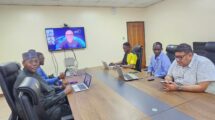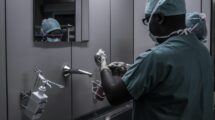Interview by Yasmeen Al-Kouz
AC3 continues with its #womeninSTEM campaign with Farida Fassi, a Professor of Physics at Mohammed V University in Rabat. Farida was awarded with the European Ph.D. in Experimental Particle Physics in recognition of her contribution in the ATLAS experiment at the European Organization for Nuclear Research (CERN) in Switzerland. She has been a member of the ATLAS collaboration since 1998 and the CMS collaboration since 2002, where she was responsible for leadership of several international research teams.
Prof Fassi is genuinely excited about her research topics that are centred on connecting theoretical particle physics with experimental results. This includes search for new physics phenomena that can be produced in the LHC’s proton-proton collisions, motivated by the presence of dark matter in our universe. She is convinced that particle physicists share the excitement of discovery, inspiring young minds.
What first sparked your interest in Physics and ultimately led to the career path you took?
When I was a little girl, my parents nurtured my curiosity and problem-solving skills through practicing home tasks such as cooking, doing household chores, planning a trip and so forth. They fostered my critical thinking by playing a crucial role in encouraging and supporting my natural abilities to learn science at home. Thanks to my parents, and especially to my Aunt Mariam, I have learned how to appreciate science that provides us a way of thinking and knowing the world better. I have always been fascinated by knowledge, because it can give power to human beings to know how to explore nature and harness energy, understand our environment and use them for our benefits.
My passion for mathematics started at school. I used to quickly finish my related household chores and hide in my bedroom for the rest of the day solving mathematical problems. I have a naturally inquisitive mind and the enjoyment of numerical investigation gave me the motivation to learn more. I have come to realize the importance of mathematics in everyday life, a base to so many subject areas such as physics and engineering.
My interest in physics started during my teenage years, as a curious person who tried to understand the world around us. Combining the curiosity with hard facts and a good knowledge of mathematics is the best process to build scientific knowledge. I believe that mathematics is the only legitimate approach to study physics of the infinitesimal. And then, the experimental validation of the physics mathematical models to interpret data either to confirm or to reject a hypothesis via models predictions.
You have an impressive list of accomplishments working as a professor and researcher. Could you briefly describe your major research interests/current projects?
I have a true passion for science and a real need to understand the building blocks of the universe, from its early stages to its current state and future evolution. I explore the properties of fundamental particles at the highest energy proton-proton collisions at the Large Hadron Collider (LHC) at CERN in Geneva, Switzerland and using the novel instrumentation of the ATLAS Experiment, dedicated high-speed electronics and real-time data processing, and cutting-edge data analysis algorithms. My research spans many areas of interest that require mastering challenges related to instrumentation (e.g. beams and detectors), data acquisition, selection and analysis, and making data and results available to the broader science communities. My main areas of interest are Top quark, Higgs Boson and Dark Matter domains, with special emphasis on exploring and deploying of new experimental techniques such as Machine Learning algorithms to help address the more difficult aspects of data analysis.
I am also involved in Grid Technologies for wide-area networks in the distributed computing, such as distributed data generation, simulation, processing, transferring and data analysis worldwide.
After completing your Ph.D., what was your experience finding your first professional position? Did you find that being a woman either positively or negatively impacted your search in a field that was historically male dominated?
After being awarded the European Ph.D. in physics I did postdoctoral studies and research positions at the Spanish Research Council, the French National Centre for Scientific Research and National Center for Particle, Astroparticle and Nuclear Physics. I have always been fascinated by the people who accomplished extraordinary feats and highest value in science, primarily in particle physics. I got into the particle physics domain without worrying about the small number of women in it. I haven’t experienced any prejudice and the fact that there were so few women actually inspired me, because I wanted to emphasize the importance of diversity in general – not only in terms of gender, but also ethnicity, culture and traditions.
You’re very passionate about gender equality in STEM subjects. What is your take on why women are underrepresented in these topics? And what do you think can be done to change this?
We have to mitigate the shortage of women in science via promoting and encouraging careers in science. The benefits of gender balance are not just for women and girls, but to ensure the coherence of the human beings as a cornerstone of society. The promise approach to achieve gender balance in sciences is to show young people the full range of scientific professions while they’re still at school. Fostering and supporting girls to consider scientific careers may help them to choose to study science disciplines.
It is essential to ensure that everyone has the same opportunities, regardless of gender, ethnicity or culture. This is the true meaning of equality, and having an open and welcoming environment is critical to support diversity. Role models do aide to motivate and it is worth to enhance it in both the Islamic World and Africa. Having women in positions of responsibility in scientific institutions is useful to show the younger generation that a brilliant career in science is possible for women. In the Islamic World and Africa, we have to foster diversity in all aspects -gender, ethnicity and culture. Special initiatives for encouraging girls to undertake scientific studies have to be established.
What inspirational message would you give young girls to inspire them to pursue STEM?
You are smart enough and capable enough to join any field in STEM, and you are equally as deserving to be in these fields as anybody else. Follow your curiosities and believe in yourself.





